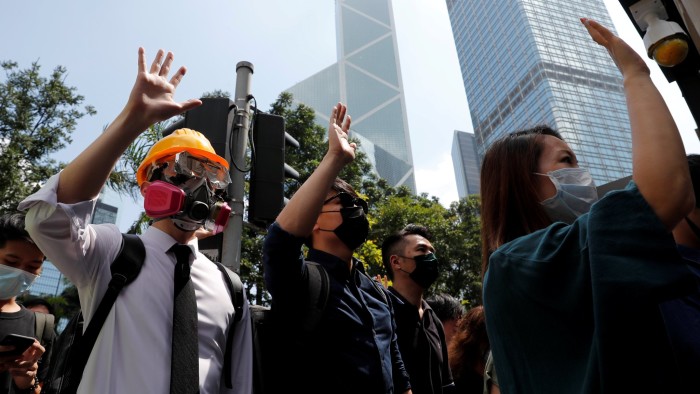Hong Kong offices become new battleground in protests

Roula Khalaf, Editor of the FT, selects her favourite stories in this weekly newsletter.
Hong Kong’s protests have presented companies with a challenge that most management textbooks do not cover: how to keep your business running when political tensions on the streets spill over into the workplace.
The protests are entering their seventh month and both sides are becoming more embittered. On Monday evening, Hong Kong police said they had defused two homemade bombs, the second time since the demonstrations began in June that they have made such a claim.
The impact of the split in the city is now being felt at the office, with staff forming cliques that increasingly refuse to work together — or even to talk to one another.
The most debilitating divisions are between Hong Kongers and mainland Chinese, a split made all the more acute by the fact the two groups speak different Chinese languages, senior bankers in the city and other managers say.
“It’s just becoming a Cultural Revolution-type of situation where people rat on others,” said a mainland Chinese partner at an international law firm, who is opposed to the protests. He said he felt some local colleagues now shunned him.
“At this point it’s not about politics, it’s about ideology,” said the partner, who has lived in Hong Kong for 10 years. Like most people interviewed for this article, he did not want to be quoted by name for fear of retribution.
A senior executive of one of Hong Kong’s largest property companies told the FT that the amount of time spent resolving arguments that can erupt anywhere in the office from the restrooms to the boardrooms had become “unsustainable” for the normal functioning of business.
In some cases, said a manager of one large asset management company, the Mandarin speakers and the Cantonese speakers had staked out particular time slots in the lunch room, and made it clear that the other group was not welcome.
To deal with the rising tensions, some companies in Hong Kong have drafted in specialists.
“There is no rule book for how to deal with this,” said an executive at one consultancy that has advised crisis-stricken multinational companies.
The person said that since August, his company had received more calls for advice on how to “de-escalate” arguments that threaten to bubble over into conflict. Such arguments had broken out on the shop floor at retail companies, he added.
They have also emerged between longstanding colleagues on the trading floor of one bank, according to an employee.
Advice for how to resolve them includes altering one’s body language or introducing talking points to defuse aggression.
Felix Yip, a management lecturer at the Hong Kong Baptist University, said many companies had issued instructions to employees to avoid discussing politics altogether in the office.
“There are lots of local and multinational companies talking about this to their employees,” Mr Yip said.
On the streets, protesters often discriminate against people speaking Mandarin and have attacked them on occasion as their rage against Beijing has grown. Managers have had to act to protect mainland staff spooked by these incidents.
One Wall Street bank arranged temporary posts on the mainland for Chinese employees fearful for the safety of their families, said an employee of the bank. “If they’re leaving the offices [in Hong Kong], they make sure they do it in groups.”
But discrimination can run in the other direction too. Law Ka-chung, former chief economist at the Hong Kong unit of the Shanghai-headquartered Bank of Communications, told the FT he was ousted from his role in October because he was a Hong Konger. “They don't think it's appropriate for a Hong Kong guy to speak on behalf of the Chinese bank,” he said.
George Hammond, Primrose Riordan, Alice Woodhouse, Ravi Mattu and Leo Lewis in Hong Kong
Comments